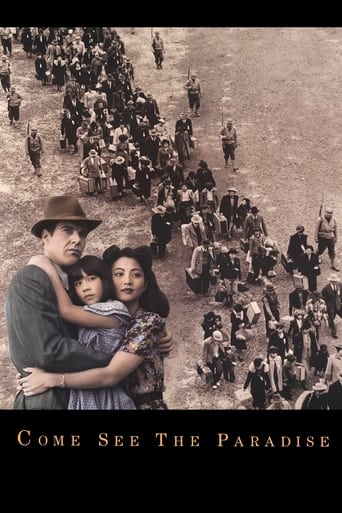hrudolph-85358
This film, though not as historical and educational as it could have been on the topic of Japanese internment camps during World War II, was not meant to be a historical documentary. The film depicts the lives of Japanese American citizens as their lives undergo immense changes with the beginning of internment camps. The main focus of this movie is the love story between Jack and Lily, however there are some historically accurate parts of the film worth paying attention to. The depiction of life right before entering the camp and then later in the camp is worth noting. Leading up to the camp we are able to see the racism these Japanese Americans had to face, with vandalism and assault towards anyone resembling a Japanese person. The movie then spends a short amount of time depicting life inside the camp, however we get glimpses of the struggles facing those encamped. For example, there is the struggle each person faces of which country to pledge their allegiance to. First off, they don't know who is going to win the war and pledging either way could present dangers to them later. Second, pledging to America may be hard since Americans are the ones interning them, however, they are American citizens and so pledging to a country some of them have never even been to may seem weird and hard to do. In addition, the film does depict the struggle to maintain identity in the camp, demonstrated by Lily's father. Overall the camp experience is historically accurate even if it only takes up a small portion of the film.
This movie could have been improved in many ways to make it more historical, however I completely understand why it was made this way. It is a hollywood film made for a large audience, and this audience doesn't want a documentary on Japanese internment camps. The love story between jack and Lily was 100% necessary to attract a large audience because that is the type of thing Americans look for in a film. For the average American not watching this movie through a historical lens, I would say it's a decent movie. It's better to have a movie with some historical facts and other faults that a large audience will watch than a completely historically accurate film which will only attract those already interested in history. At least a good portion of people are now gaining a broad knowledge on Japanese internment camps.
hritchey-40709
Come See the Paradise is another typical Hollywood depiction of a rarely mentioned event in America's complicated history. The movie does its job of creating an emotional reaction and one that makes you feel sympathy for the characters and their situation, but in terms of historical content there are some inconsistencies. My biggest question after watching this film is the necessity of including a love story amongst a topic that could constitute its own movie. In my opinion, the notion of holding people in a camp against their will should constitute enough emotion that a romantic interest is not necessary. Sure, the love story adds an aspect of intrigue and brings people to the movie by playing up the romantic storyline, but, in actually, the depicted relationship is wildly inaccurate in a historical sense. An interracial couple such as Lily and Jack would have had immensely more struggles in their daily lives. The fact that they just walked into a wedding as a couple and nobody said anything to them would have been highly, highly unlikely in the 1930's. Likewise, the couple would have had trouble procuring service at a restaurant, getting a hotel room and even going out in public without garnering some quizzical looks. I understand the necessity of including a love story for modern audiences, but to someone watching with the intent to analyze historical content this can be more of a distraction than a delight. I believe that the scenes taking place in the camp could have completely stood on their own without the appearance of Dennis Quaid's character. Conversely, the movie was fairly accurate with other historical details related to the life of the Kawamuras. The recreation of Little Tokyo was filled with impressive props and attention to detail. The reference to the Japanese Citizen's League, Question 26 concerning American loyalty and the No-No boys were a sight for weary eyes at that point in the movie. In the end, nothing can be done about the fact that, overall, this is a Hollywood production and the main goal of the movie is to put people in the audience. In terms of historical accuracies, there was good attention to detail in general, though the love story is an unnecessary aspect of the film. The main redeeming aspect of this film is that it spreads the story of Japanese internment to Hollywood's audiences, but why must this be done through an aspect of love? Isn't the narrative of life before, during and after internment enough to create a film worthy of Hollywood?
Amelia Earhart
"Come See the Paradise" is nothing short of an insulting representation of what occurred in Japanese internment camps during World War II. While there are some redeeming qualities, it is masked by the incredibly awkward sexual interactions between Jack and Lily and the racial insensitivity. It is incredible that anyone who reviewed the film before letting it be shown in theaters would think that making a joke about Chinese people eating dogs was appropriate for the context of the film. One of the main questions I have about the film is why Dennis Quaid's character was necessary and if the director thought Jack was necessary, why did they not include the interrogation of Jack in the movie? This would have increased the quality of Jack's character tenfold. The red scare was a huge part of the time period and to reference it without developing the topic further was very confusing. There are only two semi redeeming plot lines that occur during the film that can somewhat accurately portray what it may have been like to be in a camp: Mr. Kawamura's rapid decline in the camp and Charlie's turn towards Japanese allegiance. Mr. Kawamura's rapid loss of self-respect and sense of self is an accurate portrayal of what happened to many people within camp systems because it showed how camps systematically could break people's psyche. Charlie joining the JCL, shaving his hair, and being sent to Tulley can be seen as a representation of the transformation of self within the camp. Charlie, having lost a sense of purpose within the camp system, found a new purpose by directing his allegiance to Japan. Many people have little knowledge about Japanese internment camps and this movie had the opportunity to introduce people to camps in a way that was representative of the camp system but failed to do so. The audience doesn't even see the camp until halfway through the film and the buildup to the camp is focused mostly on the relationship between Jack and Lily. Overall, I wouldn't recommend anyonesee if this movie unless the purpose was to point out why Hollywood is unable to do movie about camps well.
NateWatchesCoolMovies
Alan Parker's Come See The Paradise tackles a little spoken of, tragic period of American history: the internment of thousands of Japanese families in prison camps following the attack on Pearl Harbour, which sparked World War II. After the incident, a wave of frenzy and paranoia roiled across the states, and many of these people were separated from their loved ones for years, an event that altered thousands of lives, but not one you hear too much about in film. Parker is a born storyteller, whether it's historical lore or Gothic genre brilliance (insert obligatory Angel Heart reference), and here he approaches the subject matter with little to nothing in the way of melodrama, classic orchestral swells or tissue box bait, letting the story happen naturally and neutrally, the drama organically rising scene to scene as they happen. Dennis Quaid plays an Irish American man who falls in love with a Japanese girl (Tamlyn Tomita), and over a few years begins a life with her. He is a fiercely independent union man, passionately fighting for the working class, while she comes from a very tight knit family who rely on each other to make ends meet. Somehow the two of them make it work amidst the early stages of the American working machine, the love they have for each other keeping them afloat. Then the attacks occur. Quaid is separated from her and their daughter for over a decade, and the film's pacing makes you feel every lost, broken moment of it. When their reunion does happen, it's nothing like the romantic, tear jerking catharsis you'd expect, but a testament to Parker's commitment to realism. The sadness comes from the hollow, unceremonious way in which these people are affected by such things, and how they simply go on, adapt and adjust, the pain an intrinsic part of everyday life. The movies show a different picture of that usually, an idealistic bubble where things always somehow end up alright, and every last thread is tied off somehow. Not with this one, which is why it may have been forgotten. In any case, it's a beautifully tragic, eye opening piece that stays true to its narrative and follows it's characters throughout bittersweet, minimalistic and believable arcs.




